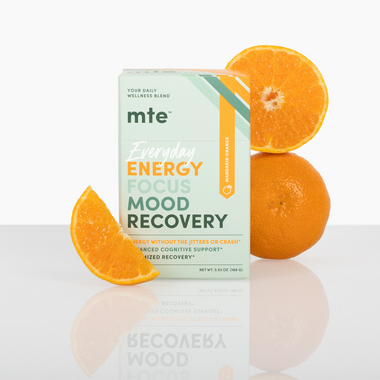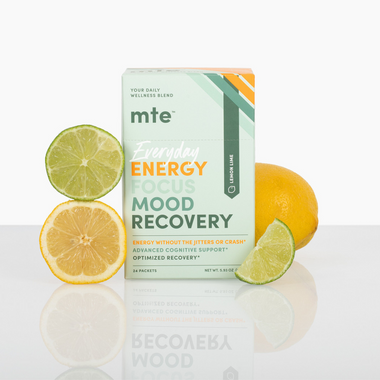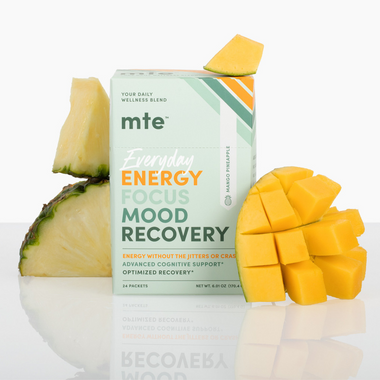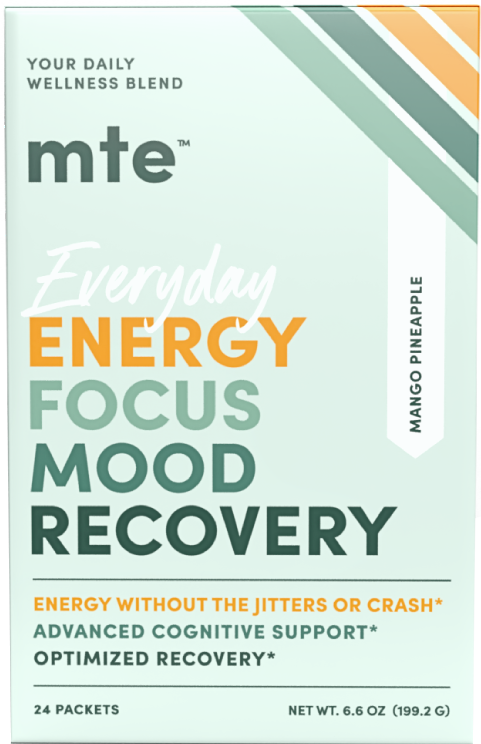
5 of the Best Nootropics for Caffeine-Free Peak Performance
Caffeine is the world’s best-known nootropic, and inarguably the most widely used. But is that because it’s actually the best nootropic drink for energy, focus and mood? Or simply because it’s extremely common, cheap to produce and readily available? The health and wellness world has been looking into that over the last few decades, which has made it clear that, no, it’s not the best – especially if you want jitter-free energy and focus, which most of us just can’t get with caffeine.
That’s just the nature of caffeine; it’s a double-edged sword – just as beneficial as harmful in some ways. Thankfully, other nootropics have recently stepped into center stage, and with a whole cast of scientific evidence to support their efficacy. Here are the 5 most well-supported and effective nootropics to consider in your search for a caffeine-free, natural energy boost:
1. Paraxanthine
Paraxanthine should be a key player in any nootropic stack. Basically a shadow of caffeine, paraxanthine is produced when caffeine is broken down in the liver. As an isolated ingredient that’s been synthesized in order to add to healthy energy drinks, powders, capsules, and other products, it overshadows everything about caffeine.
That’s because, while it acts on the same receptors and neurotransmitter activities, paraxanthine does it without provoking a false stress response, the way caffeine does. Likewise, while it still dampens adenosine activity, it doesn’t totally block it. The combination of these differences means paraxanthine boosts energy, focus, mood, and performance, but it accomplishes these things without increasing stress, causing a crash or disturbing your sleep.
Recent studies support this nootropic alternative to caffeinated drinks. Various study results indicate paraxanthine may:
- reduce stress and anxiety.
- increase dopamine and protect dopaminergic cells.
- encourage focus and memory.
- enhance physical performance.
- is safer than caffeine and causes less toxic effects.
This same body of studies also indicate paraxanthine:
- doesn’t cause tolerance or dependence.
- doesn’t cause a stress response.
- doesn’t cause a rebound.
- doesn’t disturb sleep.
A 2024 study on paraxanthine’s ability to boost cognition tested runners before and after a 10km run. Participants took a cognitive test, then consumed paraxanthine, caffeine or placebo, took the cognitive test again after a 60-minute rest, ran a 10K, and then completed the cognitive test a final time. Linear regression was then used to analyze the effects of paraxanthine vs caffeine against the control.
The results make a pretty compelling argument for paraxanthine as a performance nootropic that’s caffeine-free:
- Only the paraxanthine group had improved test scores post-exertion.
- Post-exertion errors were lower with paraxanthine than with caffeine.
- Post-exertion reaction times were more improved with paraxanthine alone than with a combination of caffeine and paraxanthine.
- There were no reported paraxanthine side effects, nor blood markers associated with negative stimulant effects.
In all, a nootropic like paraxanthine could provide the best caffeine alternative for a productivity drink, with a bonus that it’s jitter-free energy that also promotes mood and isn’t followed by a crash.
2. Theanine
L-theanine, more commonly called theanine as shorthand, is a naturally-occurring nootropic compound in green tea, black tea and some functional mushrooms. It’s been on the supplement radar for quite a while, but l-theanine drinks are a newer thing. Theanine was first isolated in 1949 by researchers attempting to identify exactly what makes green tea so healthy.
This natural energy booster quickly became a popular food additive. Fast-forward to today, and you can find it everywhere from nootropic energy drinks to supplement capsules to MTE’s daily wellness powder. Given its history, it’s safe to say we’ll soon theanine drinks explode in popularity, because it’s got science to back up the good word of mouth.
Take just a few studies on l-theanine’s nootropic benefits for mind and body:
- Theanine may reduce stress. A 2008 study looked at the effect of l-theanine supplements on focus and mood. The group that consumed theanine consistently had more alpha brain waves than control. Alpha waves are associated with an alert calm, meaning you can stay focused without getting all irritable and stressed.
- Theanine supports cognitive performance. A 2011 study looked at the effects of theanine supplements at a single dose and also after 12 weeks of daily use. They observed improved memory and increased selective attention in the theanine group. The theanine group also had higher levels of theta waves, which are associated with cognitive alertness.
- Theanine promotes quality sleep. A 2019 study looked to test chronic l-theanine consumption as a treatment for stress-related sleep disturbances and resulting cognitive difficulties (brain fog, inability to focus, moodiness, etc). After 4 weeks, executive functioning scores increased, significant improvements were observed in sleep quality and the time it takes to fall asleep, and participants reported using less sleep medication.
The reason you’ll almost always find an l-theanine drink contains caffeine is because studies show that many of theanine’s benefits improve the experience of caffeine. However, this nootropic is just as effective an additive in caffeine-free energy drinks and wellness products targeting focus and mood.
Check out our article: Everything You Need to Know About L-Theanine
3. Saffron
Saffron – it’s not just what makes paella so delicious; it’s also a superfood. And a nootropic. And a pigment. And an immunity tonic. Overall just one of the most interesting plants out there, and an unquestionably healthy energy booster. Saffron is so named for its golden stigmas, the threads of which are the most coveted part of the plant.
From 50,000 year-old pigments in cave paintings to 6,000 year-old tinctures for cataract treatments to Medieval saffron drinks to cure Black Death, it’s no wonder there was literally a Saffron War in 14th century Austria – this guy can do it all. Saffron is stuffed to the gills with beneficial bioactive compounds like vitamins, minerals and carotenoids. Notably, its major antioxidants: safranal, crocin, crocetin, and pricocrococin are highly potent and highly bioavailable.
Studies on saffron’s nootropic properties have observed:
- A 2010 study looked at saffron as a companion to healthy weight loss efforts. After 8 weeks of daily saffron supplements vs placebo, the saffron group lost significantly more weight and snacking behaviors had also decreased.
- A series of recent studies looked at the anxiolytic (read: anti-stress) effects of saffron on people with low mood. These studies indicated crocetin was a useful adjunct therapy for common anxiety scripts, and in one study, saffron even worked just as well as a commonly-prescribed medication for anxiety and depression.
- A 2023 review on the current literature on saffron’s functional value cited no less than a dozen studies where researchers observed saffron (or its constituents) boost memory, learning and cognition in cases where there was mild cognitive impairment from stress, injury or disease.
- Saffron’s also known to increase oxygen supply to bodily tissues, supporting muscle and heart health. Other positive effects on the cardiovascular system include potent anti-inflammatory and antioxidant actions.
The chemistry of saffron is pretty cool, because it gives us insight into how saffron is supporting these mood, energy and focus processes in the body. A 2014 analysis of the studies on saffron bioactivity reported that crocin inhibits dopamine and norepinephrine reuptake while safranal prevents serotonin reuptake. Those are three main players in maintaining sustained energy, positive mood and motivated, stress-free focus without caffeine.
4. Cannabis
It’s not just a poorly-written story line of an early aughts stoner movie (How High, anyone?); cannabinoid compounds in marijuana may offer nootropic benefits, when used properly. Marijuana is a plant with very complex pharmacology – it contains well over 300 bioactive cannabinoids and terpenes. Couple that with the fact we know, like, nearly nothing about how the brain works, and you’ve got for a mysterious, albeit fascinating, series of causes and correlations.
But first, a weed warning: Cannabis as a functional nootropic is giving big 2001 energy, because it’s only meant for people old enough to understand that How High reference. Your endocannabinoid system needs to be matured to process cannabis in a way that boosts cognition instead of causing brain fog.
So, for our Millennial, Gen X & Boomer friends, the emerging clinical literature on cannabis and cognition is compelling. A 2015 analysis of cannabis and its role in adult neurogenesis concluded that cannabinoid activity does play an intricate role in protecting and generating neurons and neurochemical activity in the adult brain, specifically the hippocampal region.
Not only does this imply cannabis is a nootropic for focus, productivity and motivation, but that it’s also a nootropic for stress and mood. The hippocampal region is crucial for mobilizing and halting the human stress response, as well as mood management, and state of mind (ex. focused vs foggy, ability to pay attention, motivation, etc). Balanced hippocampal functioning can result in a homeostasis that allows you to finally unlock a feeling of clarity and jitter-free focus without caffeine or other stimulants.
And the best part is that these cognitive benefits are a result of the cannabinoids, no the THC, so experiencing THC’s psychoactivity isn’t necessary in order to use a cannabis product as a nootropic. Simply choose a product with low levels of THC.
5. Lion’s Mane
Lion’s mane, along with reishi, is probably the most famous functional mushroom in the nootropic world. It’s a multifaceted fungus with several brain-boosting talents, which is why you’ll find it in some of the best healthy drinks for energy and focus. It’s known to have anticancer, antimicrobial and antioxidant effects, all of which means it’s an immunity booster and an anti-inflammatory.
But lion’s mane may also have neuroprotective and neurogenerative functions as well, due to some key compounds, including hericenones and erinacines, which are small enough to pass through the blood-brain barrier to affect neurochemical processes. Both have been found to promote the secretion and synthesis of NGF (nerve growth factor), reduce neuroinflammation, enhance cognition and promote BDNF (pro-brain derived neutrophic factor) synthesis.
In research studies on mood and focus, lion’s mane presented the following effects:
- Improved scores in 50-80 year-old adults with mild cognitive impairments. Effects were observed at 8, 12 and 16 weeks of supplementing, but not 4 weeks after the participants stopped taking the nootropic for cognitive support
- Reduced cognitive decline in Alzheimer’s patients, including improvements in daily living and mental state over 49 weeks of use
- Lowered depression and anxiety scores in menopausal women after 4 weeks of daily intake
- Reduced scores for depression, anxiety and sleep disturbances in obese adults after 8 weeks of daily intake. This study directly observed the increase in BDNF we mentioned earlier.
A 2023 study on the effects of lion’s mane on young adults used the Stroop test to look at lion’s mane’s effects on selective attention, processing speed and executive decision-making. They observed participants complete the Stroop task significantly quicker after a single dose of this nootropic. This was accompanied by a reduction in perceived stress after 4 weeks of supplementation.
Stacking Nootropics for Custom, Caffeine-Free Energy
A great thing about nootropics is that, while adaptogens tend to offer more wide-ranging effects, nootropics are more targeted. Take paraxanthine vs l-theanine vs saffron: Paraxanthine promotes caffeine-free energy – that’s its main deal. Theanine’s main function is to promote stress resilience and support mood. Saffron’s biggest benefits are seen in cognition and focus. A nootropic stack like this synergizes each ingredient’s separate and overlapping talents to create a focus and productivity stack with jitter-free energy, as well as mood and stress support. There is a caffeine-free alternative to coffee and energy drinks – a healthier approach to finding that sustained, relaxed energy you need to zone in. And with a wellness drink powder like MTE, there’s also support for immunity, gut health, sleep, and inflammation. All without caffeine, sugars or fake sweeteners. Just saying.






